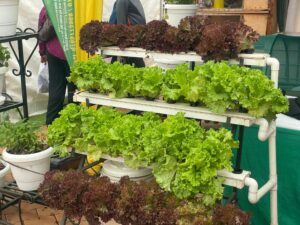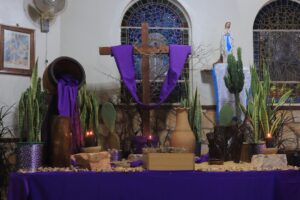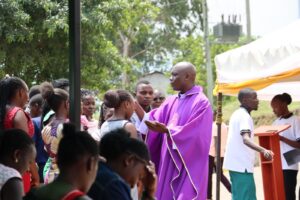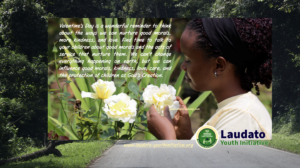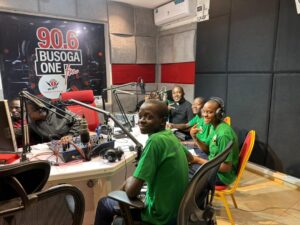By Sarah Kirikumwino | 24 July 2025 – Day three
Day Three of the Laudato Si’ Africa Conference focused on actionable commitments, stories of transformation, and sources of hope inspired by the principles of integral ecology. At the Laudato Youth Initiative, it has long been our vision to nurture an African interpretation of Laudato Si’—one that reflects our lived experiences and is grounded in our Ubuntu philosophy of unity and solidarity. As we presented our African Conceptual Framework, Entitled “What is ‘Integral’ About Integral Ecology in the African Worldview? Stories of Young African Voices Advocating for Ecological Conversion” and discussed our ways of Mobilizing Youth for Integral Ecology, we were filled with renewed hope in the impact of our Laudato Si’ Clubs and the importance of localizing Laudato Si’ in schools and communities across the continent.
Lines of Action: Localization, Inclusion, and Capacity Building
Participants affirmed the need for exchange programs between schools to share climate knowledge and practical eco-actions. These exchanges are already happening through Laudato Youth Clubs, where young people from Uganda, Kenya, and other regions collaborate through programs such as eco-literacy workshops and sustainability challenges, tracking their ecological footprints and creating context-specific solutions.
However, a major challenge remains: limited capacity in financial mobilization and resource management. Many youth-led environmental projects face funding barriers. Through the Laudato Youth Initiative, we are actively seeking partnerships, including with dioceses, to support small grant programs and sustainability training. While funding remains a challenge, the use of digital media continues to bridge information gaps, amplify voices, and raise awareness.
An essential line of action discussed was peacebuilding through inclusion, especially of refugees and youth in post-conflict areas. In Northern Uganda, Laudato Youth members are working in communities recovering from war, offering platforms for expression and action—not blame. Through tree-planting drives, eco-education, and storytelling events, these youth are being empowered to take ownership of environmental restoration. These activities do more than conserve nature—they restore dignity and offer hope to those most marginalized.
Ecological Education: A Movement Rooted in Creativity and Faith
No ecological transformation is possible without ecological education. It must reach both formal schools and informal community spaces, equipping people with the tools and mindset for climate action.
This is where our pioneering of Laudato Si’ Clubs becomes essential. These clubs unite young people under a shared purpose—climate action—and also promote intergenerational collaboration, as seen in our growing partnership with Bethany Land Institute. Together, we are helping communities learn not only about clean energy and conservation but also about how their faith and traditions connect to ecological values.
Through our clubs, children and youth engage in:
• Eco-spiritual formation, including care-for-creation prayer sessions
• Community clean-ups and advocacy
• Laudato Si’ Green Festivals, now recognized as Uganda’s first national green festival model
For example, in Fort Portal, students at Nyakasura School composed a moving poem on humanity and the environment. A participant from Zambia shared how their students wrote and performed a play on river pollution—sparking deep reflection in their community. These creative expressions not only educate but inspire transformation.
At the Laudato Youth Initiative, we deeply value storytelling as a means of raising awareness. From traditional fireplace stories to digital media campaigns, we’re reviving a powerful, African wisdom approach to passing on ecological knowledge and values through storytelling.
Agroecology, Food Security, and Sustainable Livelihoods
Another pressing topic on Day Three was food security. Too often, the discussion stops at access to food—without addressing food sovereignty, where communities manage their own food systems from production to processing.
In the context of Africa’s agricultural economies—especially in Uganda, where devotion to St. Adolf and the Uganda Martyrs reminds us of the dignity of labor—integral ecology provides the lens to see agriculture not just as survival, but as stewardship.
Within the Laudato Youth Initiative, agroecology is taking root as both an empowerment tool and a spiritual practice. Examples include:
• Permaculture and compost training in Rwanda
• Organic farming demonstrations in Uganda in partnership with Fruits of Faith Farm
• School kitchen gardens, parish model gardens, and home-based gardens in small Christian communities
These efforts are not only improving food security but also preserving indigenous seed systems and promoting smart farming methods for both the youth and the elderly.
Participants further emphasized the importance of building sustainable business models around ecological principles. At Laudato Youth, we support green entrepreneurship, such as:
• Upcycled fence poles and eco-brick production
• Natural cosmetics made from local ingredients
• Creative recycling projects led by young innovators
These ventures prove that livelihood and environmental responsibility are not mutually exclusive—they can thrive together.
Living the Conversion: Toward a Laudato Si’ Generation
As the day came to a close, one question lingered in every heart:
“Ten years of Laudato Si’—where is Africa?”
For us, the answer is clear: Africa is rising.
The stories of conversion we heard—of refugee inclusion, school gardens, youth-led tree planting, and local clean energy adoption—must no longer be isolated. They are threads in a larger tapestry woven by the growing Laudato Youth Initiative across Africa.
Our partnership with Bethany Land Institute affirms our journey of living the conversion. From storytelling to clean energy to sustainable livelihoods, our work demonstrates that faith, action, and justice are not separate—they are inseparable.
As Pope Francis reminds us: “Many things have to change course, but it is we human beings above all who need to change.” (Laudato Si’, 202). The youth of today are searching for faith and a better tomorrow. That is the Kingdom of justice and peace we are striving to build.
As we prayed and continue to pray for Pope Francis, we reaffirm our commitment to uphold his ecological legacy. We, the Laudato Youth, are united for climate action standing as a generation committed to hope, faith, and ecological justice.










